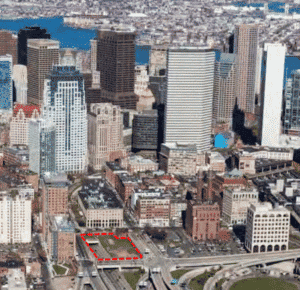
Six development teams are drawing up plans to develop MassDOT parcel 25 that not only match current real estate market conditions but satisfy the agency’s new diversity selection criteria.
Vying for one of the last Big Dig remnant parcels in Boston, six development teams are balancing the usual decisions about a market-ready mix of property uses with new elevated standards for diverse design and project ownership teams.
Downtown’s Parcel 25 is the first test of the Massachusetts Department of Transportation’s new diversity requirements for dispositions of publicly owned parcels. The agency will count teams’ diversity strategies as 25 percent of the evaluation criteria, and some teams have already committed to a substantial minority ownership structure.
“MassDOT raised the bar and we took that to mean our whole scorecard up and down the project,” said Noam Ron, partner at the Hudson Group and part of a four-company team that’s proposing 300,000 square feet of R&D space and 302 housing units. “All four pieces have actual meaningful percentages of equity in the project. This is a wealth creation model and we’re taking that to heart.”
MassDOT is the latest public agency to incorporate diversity requirements into the selection process for surplus property dispositions. Massport pioneered the model at a trio of hotels on its properties in South Boston. The Boston Planning & Development Agency added minority participation requirements for a series of pending dispositions, including the proposed 350,000-square-foot redevelopment of the Blair lot property in Nubian Square.

Parcel 25. Image courtesy of MassDOT
The requirements, developers say, can move the needle in a city where the field of minority-owned design, development and construction firms remains thin.
“There aren’t as many established high-growth minority firms in Boston, but MassDOT has taken a strong position,” said Bo Menkiti, a Boston native and Washington, D.C. developer and broker who is partnering with Brookfield Properties, Hudson Group and Boston-based minority-owned construction manager RISE Together on a parcel 25 bid.
Housing, Labs Pitched for Gateway Parcel
The 1.3-acre parcel 25, located next to the southbound portal of the O’Neill Tunnel, could be approved for building heights up to 300 feet. Six teams submitted an assortment of development plans ranging from predominantly housing to all commercial space.
MassDOT has not released the submissions, but several teams shared details of their diversity and development strategies in response to queries from Banker & Tradesman. Some have paired up based upon past partnerships or word-of-mouth relationships, while others are still assessing potential partners.
Life science developer BioMed Realty proposed an all-lab project that executives say could yield superior benefits to the community than on-site housing. MassDOT asked that 20 percent of the project’s housing component be income-restricted.
In March, former Boston Mayor Marty Walsh increased linkage fees on large commercial developments over 100,000 square feet to $15.39 per square foot. As proposed, BioMed’s 736,000-square-foot life science development would generate approximately $8 million in payments to the city to support affordable housing creation and workforce training. And some mayoral candidates already have proposed additional linkage fee increases.
“We opted to incorporate a pretty significant lab component and one that allows us to leverage our expertise operating and owning it,” said Sal Zinno, vice president of development for BioMed Realty. “What comes out of that will be some significant linkage fees for housing and jobs.”

One of the last downtown Boston parcels left over from the Big Dig, Parcel 25 is the latest test case for the “Massport model” for growing the number of minority-owned real estate and construction firms.
That’s not to say that BioMed intends to sign its checks and walk away from long-term involvement in community benefits. The firm has retained diversity consultant Lazu Group, led by former Berkshire Bank executive Malia Lazu, to begin community outreach. Lazu has already met with community groups including the Chinese Progressive Association to survey their priorities.
“If we get awarded this project, this becomes an ongoing relationship. We don’t just show up at the permitting, but want to follow the process and keep engaged throughout the life cycle,” Lazu said.
Lazu is a regular op-ed contributor to Banker & Tradesman.
National Development and Alexandria Real Estate Equities are pairing up with Alinea Capital Partners, a development firm run by former Massport director L. Duane Jackson, and the Asian Community Development Corp. The team proposes 330,000 square feet of lab space and 93 housing units.
“National Development’s approach to DEI: ‘Equal. United. Empowered. We are better together’ mandates that our team of partners, consultants, suppliers and subcontractors include many firms that are owned and operated by women and minorities. This is how we plan to do our share to level the playing field in Boston,” National Development Managing Partner Brian Kavoogian said in a statement. “Parcel 25 is no exception: our ownership, consultant, construction and operating team consists of talented, minority and women-owned firms that will play an important role in this project.”
One-Stop Shopping for Diverse Partners
The Boston-based Builders of Color coalition is offering one-stop access to the local industry’s diverse talent pool with the recent release of its Boston Minority Real Estate Directory. The document includes approximately 520 local professionals concentrated in the investment, brokerage, development and architecture industries.

Steve Adams
One imminent opportunity is the BPDA’s parcel P3 in Roxbury, the site of a series of failed development attempts. The coalition will participate in a May 26 BPDA virtual hearing on how to structure an upcoming new request for proposals to maximize opportunities for minority-owned developers.
“My own goal was by the end of this year, I don’t want to hear the phrase anymore that folks can’t find people of color to work with on teams,” said Builders of Color Coalition founder Dave Madan, a Boston multifamily developer. “We’re able to answer that first question in Boston about where to find folks to work with, so there’s a critical leadership mass that is able to transform the culture to the point that it becomes self-replicating.”




 |
| 